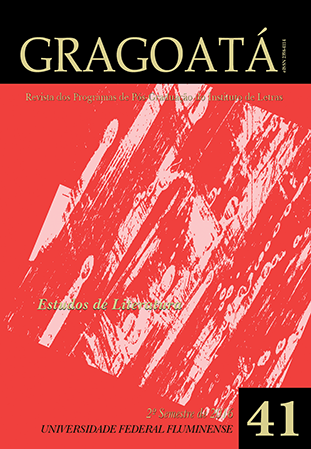Julio Herrera y Reissig: Poetry with Pedals
DOI:
https://doi.org/10.22409/gragoata.v21i41.33436Keywords:
Julio Herrera y Reissig (1875-1910), Silenced diaeresis, Hispanic-American Modernism, Music and Poetry, Rhythm.Abstract
In his explanatory notes regarding the solutions he adopted for the translation of two French poems, the Uruguayan poet Julio Herrera y Reissig (1875-1910) defends the use of the “silenced diaeresis”, taking it as the starting point of a large proposition in favor of a new music of the verses. Through the concurrent employment of a series of specific resources, it would enable the promotion of a new music for poetry in Spanish. This essay argues that Herrera y Reissig’s notes on this subject have a tactical function that goes far beyond technical and normative discussions, and may be interpreted as a prescription for and a description of the music of the so-called Modernist Hispanic-American poetry. His notes lead to the perception that the poetic rhythm is not wholly inscribed in the text, but not altogether independent of the text: it is produced historically, in complex constructs, with the intervention of various members of a constantly dynamic community including poets, readers, editors, scholars.Downloads
Downloads
Published
How to Cite
Issue
Section
License
Authors who publish in Gragoatá agree to the following terms:
The authors retain the rights and give the journal the right to the first publication, simultaneously subject to a Creative Commons license CC-BY-NC 4.0, which allows sharing by third parties with due mention to the author and the first publication by Gragoatá.
Authors may enter into additional and separate contractual arrangements for the non-exclusive distribution of the published version of the work (for example, posting it in an institutional repository or publishing it in a book), with recognition of its initial publication in Gragoatá.

Gragoatá is licensed under a Creative Commons - Attribution-NonCommercial 4.0 International.











